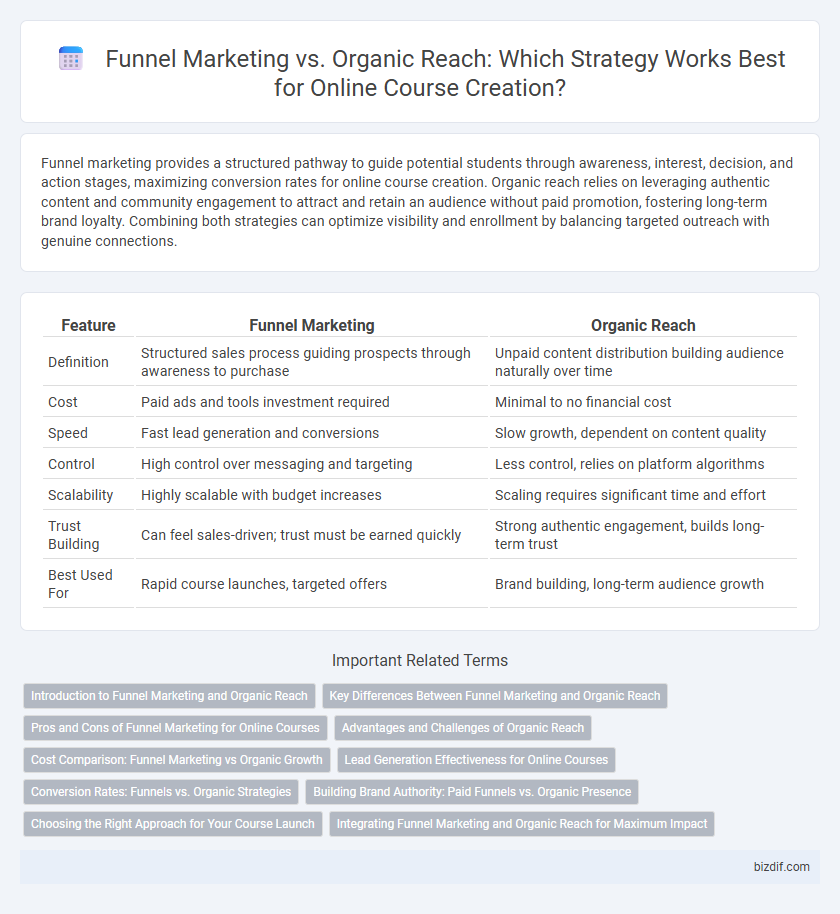Funnel marketing provides a structured pathway to guide potential students through awareness, interest, decision, and action stages, maximizing conversion rates for online course creation. Organic reach relies on leveraging authentic content and community engagement to attract and retain an audience without paid promotion, fostering long-term brand loyalty. Combining both strategies can optimize visibility and enrollment by balancing targeted outreach with genuine connections.
Table of Comparison
| Feature | Funnel Marketing | Organic Reach |
|---|---|---|
| Definition | Structured sales process guiding prospects through awareness to purchase | Unpaid content distribution building audience naturally over time |
| Cost | Paid ads and tools investment required | Minimal to no financial cost |
| Speed | Fast lead generation and conversions | Slow growth, dependent on content quality |
| Control | High control over messaging and targeting | Less control, relies on platform algorithms |
| Scalability | Highly scalable with budget increases | Scaling requires significant time and effort |
| Trust Building | Can feel sales-driven; trust must be earned quickly | Strong authentic engagement, builds long-term trust |
| Best Used For | Rapid course launches, targeted offers | Brand building, long-term audience growth |
Introduction to Funnel Marketing and Organic Reach
Funnel marketing strategically guides potential learners through targeted stages, increasing course enrollment by nurturing leads with personalized content and calls to action. Organic reach relies on authentic engagement through SEO, social media presence, and user-generated content to attract and retain a natural audience without paid advertising. Combining funnel marketing with organic reach maximizes visibility and conversion for online course creators.
Key Differences Between Funnel Marketing and Organic Reach
Funnel marketing utilizes a structured, step-by-step process to guide potential students from awareness to enrollment through targeted ads, email sequences, and retargeting strategies. Organic reach relies on free methods such as content marketing, SEO, and social media engagement to attract and nurture an audience naturally over time. Funnel marketing offers faster conversion rates and measurable analytics, while organic reach builds long-term trust and sustainable growth without direct advertising costs.
Pros and Cons of Funnel Marketing for Online Courses
Funnel marketing for online courses offers targeted lead nurturing, increasing conversion rates by guiding prospects through a structured buying journey, but it requires significant upfront investment in tools and content creation. It provides measurable analytics and automation, enabling personalized communication and timely follow-ups, though complex funnels may lead to audience fatigue if not optimized properly. While funnel marketing delivers faster revenue growth compared to organic reach, it demands continuous testing and refinement to maintain effectiveness and reduce customer acquisition costs.
Advantages and Challenges of Organic Reach
Organic reach in online course creation leverages authentic audience engagement through content optimization, community building, and SEO strategies, resulting in higher trust and sustainable growth without advertising costs. Challenges include slower audience expansion, dependence on platform algorithm changes, and the need for consistent, high-quality content to maintain visibility. This approach fosters long-term relationships and brand loyalty but requires strategic effort and patience to scale effectively.
Cost Comparison: Funnel Marketing vs Organic Growth
Funnel marketing typically requires upfront investments in paid ads, landing page development, and CRM tools, often resulting in higher initial costs compared to organic growth strategies. Organic growth relies on consistent content creation, SEO optimization, and social media engagement, which usually incurs lower direct expenses but demands more time and effort to yield measurable results. Evaluating cost-effectiveness depends on the course creator's budget, timeline, and scalability goals within the online education market.
Lead Generation Effectiveness for Online Courses
Funnel marketing leverages targeted ads, email sequences, and tailored content to systematically capture and nurture leads, driving higher conversion rates for online course sign-ups. Organic reach depends on SEO, social media engagement, and content marketing, which can build trust and attract quality leads over time but often requires more consistent effort and slower results. Funnel marketing typically yields faster lead generation effectiveness, while organic strategies create sustainable, long-term audience growth for online courses.
Conversion Rates: Funnels vs. Organic Strategies
Funnel marketing systematically guides potential students through targeted stages, resulting in higher conversion rates compared to organic reach strategies that rely on broad, less predictable audience engagement. Data shows funnels convert visitors to customers at rates of 10-30%, outperforming organic social or SEO efforts, which average 2-5% conversion. Optimizing sales funnels with personalized messaging and retargeting significantly boosts course enrollment efficiency over relying solely on organic traffic growth.
Building Brand Authority: Paid Funnels vs. Organic Presence
Paid funnels accelerate building brand authority by targeting specific audiences through data-driven campaigns, generating immediate leads and measurable ROI. Organic presence fosters long-term brand credibility by consistently delivering valuable content that encourages genuine engagement and trust within the community. Combining funnel marketing with organic strategies maximizes visibility, leveraging both rapid acquisition and sustainable reputation growth.
Choosing the Right Approach for Your Course Launch
Funnel marketing leverages targeted ads and step-by-step engagement sequences to convert prospects into paying students efficiently, maximizing ROI through paid traffic. Organic reach relies on content marketing, social media engagement, and SEO to build authentic relationships and long-term trust, often requiring more time but yielding sustainable growth. Selecting the right approach depends on your budget, timeline, and audience behavior, with many successful course launches combining both strategies for optimal results.
Integrating Funnel Marketing and Organic Reach for Maximum Impact
Integrating funnel marketing with organic reach maximizes online course visibility and conversions by combining targeted paid strategies with authentic audience engagement. Funnel marketing captures leads through optimized landing pages and email sequences, while organic reach leverages content marketing and social media to build a loyal community. This synergy enhances brand trust, drives consistent traffic, and increases course enrollment rates.
Funnel marketing vs Organic reach Infographic

 bizdif.com
bizdif.com